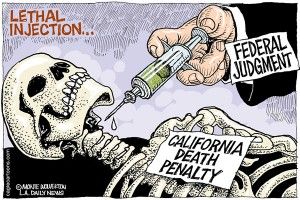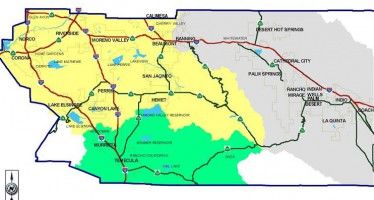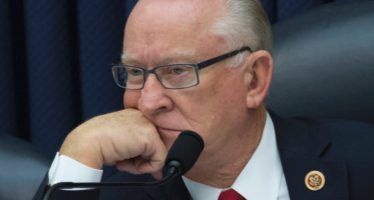CA death penalty goes on trial
 California’s practice of capital punishment has landed on a death row of its own.
California’s practice of capital punishment has landed on a death row of its own.
“The U.S. 9th Circuit Court of Appeals is scheduled to hold a hearing in Pasadena on a lower-court decision that found California’s death penalty system unconstitutional and plagued by delays that have robbed a death sentence of any value in deterring crime,” the Los Angeles Times reported. “The ruling overturned the death sentence of Ernest Jones, who was convicted of rape and murder.”
The closely-watched trial brought a close to months of anticipation in the wake of a controversial ruling against the state’s current practice of implementing capital punishment.
Pushing boundaries
Last year, as the Washington Post noted, Federal District Judge Cormac Carney “argued that because of the extremely low likelihood of execution and long delays on death row, the system was actually a penalty of life without parole with the remote possibility of death. His ruling declared that execution after such a long delay serves no retributive or deterrent purpose beyond the long prison term, and is therefore arbitrary and unconstitutional.”
According to Carney, although a better-managed program might produce a different legal result, the dysfunctional, irrational character of capital punishment in California led to a harsh judgment.
At stake was a new and broad interpretation of cruel and unusual punishment. “Jones said in his appeal that the state didn’t provide a fair and timely review of his case, the delay exceeded that in other states and death row’s conditions constituted torture,” the Times added. “He also said the uncertainty of his execution inflicts suffering and, if it ever goes forward, it will serve no legitimate purpose for retribution or deterring other criminals.”
Legal hurdles
Although activists have long criticized the implementation of the death penalty in California and other states as both inefficient and inhumane, even legal scholars with vociferous objections to capital punishment cautioned that the core structure of the federal judiciary could well prevent the 9th Circuit from upholding Judge Carney’s ruling against the death penalty.
Prof. Erwin Chemerinksy, dean of the UC Irvine Law School, told the Times that he believed Carney’s opinion to be “very strong as to why the system violates the 8th Amendment,” which prohibits the application of cruel and unusual punishment. But the panel of judges hearing the case faced tough strictures of a different sort, according to the Los Angeles Times: “Legal rules that limit the authority of federal judges in such cases.” For that reason, said Chemerinsky, “I think this court could decide the case on procedural reasons rather than the 8th Amendment,” leaving California’s institution of capital punishment intact.
Adding to the difficulty of overturning the death penalty, Attorney General Kamala Harris lobbied the court to recognize that delays in executions have more to do with protecting prisoners’ rights than curtailing them. “Despite her own reservations about the death penalty,” the San Jose Mercury News reported, “Harris has urged the appeals court to reverse the decision, saying in court papers the ruling is ‘fundamentally misguided’ because any delays in reviewing the appeals of death row inmates are meant to ensure legal protections to avoid mistakes.”
Supreme possibilities
Nevertheless, some judiciary watchers suggested that the ultimate fate of California’s system of executions is poised to end up in the hands of the highest court in the land. “With at least 40 percent of the state’s death row inmates now awaiting execution for two decades or longer, legal experts say the time may be ripe for the Supreme Court to use the California example to decide whether such delays render a state’s death penalty law unconstitutional,” the Mercury News observed.
Related Articles
Sen. Boxer: Conservation would solve drought
Can California’s zero-sum water wars only be resolved by a system of stern water conservation? That’s what California U.S.
Fast-tracking personal info
MAY 28, 2010 By KATY GRIMES Are transportation agencies selling California drivers’ personal information? Commuters on California toll roads and highways
Democratic U.S. Senate candidate picks up another Republican endorsement
In her gambit to ride largely Latino and Republican support to the U.S. Senate, Democratic Congresswoman Loretta Sanchez picked up




